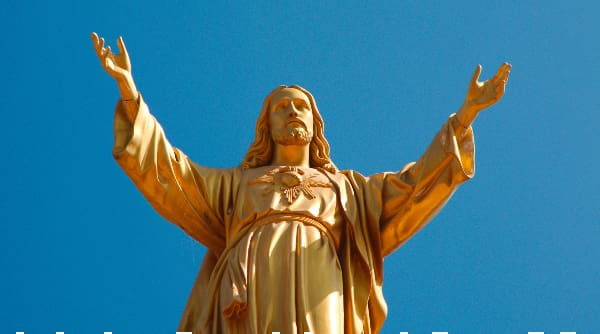PROPHET
“This is the prophet Jesus from Nazareth of Galilee.”
In the darkest hour of the darkest century of human existence, one man single-handedly led his country against the forces of an evil empire. Winston Churchill rallied the English and helped them to stand against the Nazi threat, eventually leading England to victory over Germany in World War II. He was hailed the world over as the savior of the English people and the indefatigable enemy of the forces of fascism. Surprisingly enough, however, Churchill resoundingly lost his bid for reelection shortly after the war’s conclusion. The man revered around the world was not able to defeat Clement Attlee in the race for prime minister of England. For all his popularity and his efforts to protect England, just months after Hitler’s defeat, the populace no longer felt he was the right man to lead them.
Churchill’s story is but one historical example of mankind’s fickleness. Those who appear on top of the world are rejected by the crowds, often for no discernible reason, the next day. Fashions come and go, opinions shift like the wind: it would seem that it is the prerogative of the masses to change their minds at the smallest provocation.
In the Gospels, it’s clear that Jesus reaches the heights of His popularity on Palm Sunday. Matthew recounts the scene, one that must have remained vivid in the apostles’ minds:
They brought the ass and the colt, and put their garments on them, and [Jesus] sat thereon. Most of the crowd spread their garments on the road, and others cut branches from the trees and spread them on the road. And the crowds that went before him and that followed him shouted, “Hosanna to the Son of David! Blessed is he who comes in the name of the Lord! Hosanna in the highest!” And when he entered Jerusalem, all the city was stirred, saying, “Who is this?” And the crowds said, “This is the prophet Jesus from Nazareth of Galilee.” (Matt. 21:7–11)
Jerusalem was in a state of excitement unlike anything since the Maccabean Revolt, almost two hundred years prior; Jesus was looked upon as a messenger from God, a prophet who would usher in a new kingdom. The crowds praised him as the Son of David, the greatest king in Israelite history. But to many in the crowd, Jesus was also the fulfillment of the prophecy of Moses:
The Lord your God will raise up for you a prophet like me from among you, from your brethren—him you shall heed. (Deut. 18:15)
Israel had been looking forward to the fulfillment of this prophecy for generations, hoping for the appearance of “a prophet like [Moses].” Not even Isaiah and Elijah were considered a fulfillment of this prophecy. After the Ascension of Christ, Peter was to declare that this prophecy was fulfilled with the coming of Jesus:
Moses said, “The Lord God will raise up for you a prophet from your brethren as he raised me up. You shall listen to him in whatever he tells you. And it shall be that every soul that does not listen to that prophet shall be destroyed from the people.” And all the prophets who have spoken, from Samuel and those who came afterwards, also proclaimed these days. (Acts 3:22–24)
What is interesting about this promise, however, is that Moses is not typically looked upon as a prophet; instead, he is traditionally seen as the lawgiver par excellence. Yet not considering him as also a prophet is to put a dichotomy between the Law and the prophets where one doesn’t exist, to separate what is actually a unified whole. The prophets’ principal mission is to tell the truth about God, and the Law given through Moses was the primary means by which ancient Israel knew about God: His justice, His mercy, and His holiness. The Old Testament prophets consistently preached that the people must return to a faithful practice of the Law given to Moses. The Law and the prophets were intimately linked in the Jewish religion, and Christ does nothing to separate them in His own preaching; in fact, He proclaims that He does not desire to abolish “the Law and the prophets,” but to fulfill them both (Matt. 5:17).
Throughout his Gospel, Matthew makes an effort to paint Jesus as the “new Moses,” one even greater than the first, and the lives of these two men share many commonalities. Moses had to escape death as an infant, as did the baby Jesus. The first Moses went to a mountain to receive the Law from God; the new Moses, Jesus, went to a mountain to give the new law from God, the Beatitudes (Matt. 5:1–12). On the mountain, Moses’ face shone like the sun after his encounter with God; Christ’s whole body shone brightly on the mountain of transfiguration. Moses was a law-giving prophet; the crowds on Palm Sunday recognized Jesus as the new law-giving prophet.
Yet we all know how the week that began on Palm Sunday would end. The crowds who praise Jesus as a prophet and sing Hosanna would, a few days later, shout, “Let him be crucified” (Matt. 27:22). The support of the people was a mile wide but only an inch deep. As soon as the Pharisees led popular opinion to turn against Jesus, the crowds were all too willing to send Him to his death. Jesus, who did nothing to curry favor with the people, doesn’t waver on His path in order to gain their friendship in the end.
The lives of the saints, too, reflect the fickleness of public support for those who courageously preach the prophetic truth. St. Athanasius is a particularly apt case study. A bishop at a young age, he tirelessly preached against the fourth-century Arian heresy, which denied the divinity of Christ and had swept over the Roman Empire like a plague. Athanasius staunchly defended the decrees set at the Council of Nicaea, which condemned Arianism—but because the political winds of the time tended to blow Arian, many of the bishops who initially supported Nicaea and the orthodox Faith wavered in their support. Not Athanasius. He didn’t regard popular consensus as having the power to change what the Holy Spirit decreed through the Church. The phrase “Athanasius contra mundum”—“Athanasius against the world”—was indeed fitting for him: five times, the emperor exiled him for refusing to back down against the Arian onslaught; five times, he remained faithful to true Christian doctrine. Eventually, he was restored to his Alexandrian see and permanently vindicated; the orthodox Faith prevailed, and he is considered the first Doctor of the Church.
More than a saint, Athanasius was a prophet: he proclaimed the truth about God, regardless of the consequences. Like all the prophets, he drew this strength from his foundation in the Word of God, the never-changing standard by which he discerned truth or falsehood. A prophet recognizes his own failings and weaknesses, and so he clings to the fixed Word of God all the more.
Athanasius, fervently embracing the truth of Christ’s divinity, could be confident in the standard that he followed.
This highlights perhaps the most important virtue for living the prophetic life of a saint, as St. Teresa of Ávila attests:
Those who want to journey on this road and continue until they reach the end, which is to drink from this water of life. . . . must have a great and very resolute determination to persevere until reaching the end, come what may, happen what may, whatever work is involved, whatever criticism arises, whether they arrive or whether they die on the road, or even if they don’t have courage for the trials that are met, or if the whole world collapses. (Way of Perfection, 21.2)
Perseverance is a prerequisite for being a Christian; without it, we become like the seed that cannot take root in the soil (see Matt. 13:1–8). Instead, we must strive to plant ourselves deep in the soil of the Word of God, gaining strength to withstand temptation, persecution, and tribulation; and not only to withstand them, but to grow a “hundredfold” in the Faith.
The model of perseverance is Jesus, who from the beginning knew the mission of His Father and would not be deterred from it: neither the flattery of the crowds, nor the pressure from His own disciples, nor the threats from the religious and political leaders could change His course. He persevered through every hardship and temptation. It’s a mistake, however, to believe that following the Father was easy for Christ because He was the divine Son of God. The agony Jesus experienced in Gethsemane (Matt. 26:36–46) puts to rest any thought that accomplishing the Father’s will was not a struggle for Him; it is no less a struggle for each Christian to fulfill the Father’s will for their lives.
The perseverance needed during great trials is born of forbearance in everyday hardships. “If any man would come after me, let him deny himself and take up his cross daily and follow me” (Luke 9:23, emphasis added). Every day, we can experience martyrdom through all the slight instances of suffering each day brings: enduring the small offenses of others, denying our personal desires for the sake of the good of family or friends, and serving others in small daily, perhaps unseen, tasks. These actions, the fruit of a persistent life of prayer and devotion, are what make possible the ability to stand strong in the face of overwhelming opposition.
“You have been faithful over a little, I will set you over much” (Matt. 25:21), Christ said to the man with five talents. By dying to self in small, everyday affairs, we gain strength to die to self in times of great persecution and strife. When everyone else preaches conformity to the world and its passions, the Christian continues to be founded on the Word of God, Jesus Christ. When worn down by the temptations of this world, we who desire to be saints must turn to Christ and ask for a share in the perseverance the Lord had in following the Father’s will.
Achieving any goal does not exclude failure; it presupposes it. After countless unsuccessful attempts to create a light bulb, Thomas Edison said, “I have not failed. I’ve just found ten thousand ways that won’t work.” The key is rising back up after each fall. Six years after Churchill’s defeat, he ran again and was reelected to the post of prime minister. Even though he had fallen, he simply got back up and persevered. This is the lot of those who wish to be saints as well. John of Karpathos said:
Do all in your power not to fall, for the strong athlete should not fall. But if you do fall, get up again at once and continue the contest. Even if you fall a thousand times because of the withdrawal of God’s grace, rise up again each time, and keep on doing this until the day of your death. For it is written, “If a righteous man falls down seven times”—that is, repeatedly throughout his life—“seven times shall he rise again” [Prov. 24:16]. (The Philokalia: The Complete Text, vol. 1)
It is love of God that inspires us to proclaim Christ to the world prophetically. But without perseverance like that modeled extraordinarily by St. Athanasius, we can endure neither the trials of day-to-day life nor the more significant suffering for which those trials prepare us. Daily conforming ourselves to the one who, though unchangeable, was proclaimed a prophet on Palm Sunday and a criminal on Good Friday, we will find a steadfast, never-failing support against the winds of the world.
+
This article on how to enter the narrow gate is adapted from a chapter in Who Do You Say I Am? by Eric Sammons which is available from Sophia Institute Press.
Art for this post: Cover and featured image used with permission.





